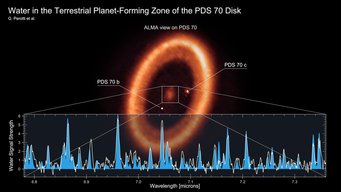Giulia Perotti receives MPG Minerva Fast Track Fellowship
Giulia Perotti, research fellow in the Planet-and Star Formation (PSF) department at MPIA in Heidelberg, has been awarded a Minerva Fast Track Fellowship by the Max Planck Society (MPG). This will enable the researcher to set up a research group dedicated to studying the early stages of planetary system formation.

Are there planets in the universe around other stars that are similar to Earth? Planets that also have water and oceans, for example, or even harbor life?
This question has been on the minds of people for centuries, and not just those involved in astronomical research. However, it was only just under 30 years ago that the discovery of the first planet around another, sun-like star ended a long phase in which it was a mere assumption that such exoplanets even existed. Since then, thousands of planets have been discovered - in some cases even entire planetary systems - with a variety of objects that goes far beyond what we know from our own solar system with Jupiter, Mars and the other planets. In addition to the discovery of fully formed planetary systems, the cutting-edge telescopes and instruments of recent decades have also allowed us to make astonishing observations of dust and gas disks around very young stars. Based on theoretical models, it was such disks that were thought to be the birthplace of our own solar system.
Both the observation of exoplanets and the observation of such planet-forming disks are a huge technical challenge. They require high sensitivity, extreme resolution and enormous contrast, because other stars are far away and the surrounding planetary systems or disks are therefore difficult to separate from the star. Furthermore, the stars outshine their surroundings. With instruments such as SPHERE, ALMA, and JWST it is now possible not only to discover other disks and planets, but also to enter into their detailed physical and chemical analysis.
This is exactly the starting point for Giulia Perotti's new project, which forms the framework for the new group. "We still lack a comprehensive and detailed picture of the material within a planet-forming disk during planet formation. But this is necessary to understand under which circumstances planets can have an atmosphere, water or even life," says Giulia Perotti. Under the title "Inner solar systems: unveiling the composition of nascent worlds", Perotti plans to use high-resolution JWST observations to study, among other things, the chemical reservoir over a large sample of “older” (>5 million years) and young (<1 million years) disks in order to find answers to important questions. These include:

- How much water is present at a late stage of disk evolution in the inner disk regions where rocky planets form?
- Does water form in the inner disk (< 10 au) or is it transported from the outer disk regions (~ 100 au)? (1 au is about 150 Million km)
- Apart from water, what is the chemical composition of the rocky planet-forming zone?
- Which physical processes influence the chemical diversity in the disks?
- Does a water-poor inner disk hints to the absence of atmospheres around rocky planets?
The connection between the chemistry of the disks and the resulting planetary atmospheres therefore plays a crucial role in Perotti´s ambitious project. It combines the fields of astronomy and chemistry in order to find out the origin of water on rocky planets.
Giulia Perotti benefits from the fact that she is a world-leading expert in observational infrared astronomy in recent years, has an international network and is involved in several large JWST observing programs (i.e., MINDS, JOYS and Ice Age).
Furthermore, her project will benefit from the excellent opportunities at MPIA, which arise in particular from the collaboration with the related departments of Planet and Star Formation (PSF, Thomas Henning) and Atmospheric Physics of Exoplanets (APEx, Laura Kreidberg).
Giulia began her interdisciplinary research in the fields of astronomy and cosmochemistry already as a doctoral student by studying meteorites. She also analyzed possible precursors of life that form in icy dust and gas around young solar-type stars. In 2021, she was awarded an independent postdoctoral fellowship at MPIA Heidelberg and in 2023 she was awarded the Patzer Prize.
The funding for the new research group will start in October 2024 and is initially set to run for 3+1 years. The Minerva group will consist of two postdocs, one doctoral student and two additional Master's students.
The MPG will also honor the award winner at its Annual General Meeting on June 11.
The Max Planck Society's Minerva Fast Track Program (see here) offers outstanding female scientists the opportunity for long-term career planning after their doctorate. It was initially introduced in 2014 in the MPG Sections Chemistry, Physics and Technology as a building block for increasing the proportion of women in scientific leadership positions - while maintaining the highest quality standards.
Further links related to Fig. 2:
https://www.nature.com/articles/s41586-023-06317-9
https://www.mpg.de/20541783/water-rocky-planets
KJ/GP

